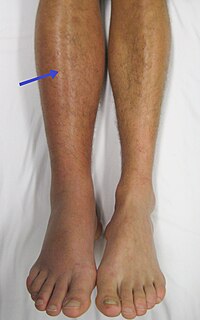
Photo from wikipedia
Abstract Previous adverse pregnancy outcomes (APO) in women with hereditary thrombophilia have emerged as new indications for prophylactic use of low-molecular-weight heparin (LMWH) during pregnancy. Recent meta-analysis conducted to establish… Click to show full abstract
Abstract Previous adverse pregnancy outcomes (APO) in women with hereditary thrombophilia have emerged as new indications for prophylactic use of low-molecular-weight heparin (LMWH) during pregnancy. Recent meta-analysis conducted to establish if LMWH may prevent recurrent placenta-mediated pregnancy complications point to important therapeutic effect but these findings are absolutely not universal. Furthermore, previous studies regarding LMWH prophylaxis for APO in women with inherited thrombophilia were performed in high risk patients with previous adverse health outcomes in medical, family and/or obstetric history. Therefore, the aim of this study was to investigate the effects of LMWH prophylaxis on pregnancy outcomes in women with inherited thrombophilias regardless of the presence of previous adverse health outcomes in medical, family, and obstetric history. Prospective analytical cohort study included all referred women with inherited thrombophilia between 11 and 15 weeks of gestation and followed-up to delivery. Patients were allocated in group with LWMH prophylaxis (study group) and control group without LWMH prophylaxis. The groups were compared for laboratory parameters and Doppler flows of umbilical artery at 28th to 30th, 32nd to 34th and 36th to 38th gestational weeks (gw), and for obstetric and perinatal outcomes. The study group included 221 women and control group included 137 women. Mean resistance index of the umbilical artery Ri in 28 to 30, 32 to 34, and 36 to 38 gw were significantly higher in the control group compared to study group (0.71 ± 0.02 vs 0.69 ± 0.02; 0.67 ± 0.03 vs 0.64 ± 0.02; and 0.67 ± 0.05 vs 0.54 ± 0.08, respectively). Intrauterine fetal death (IUFD) and miscarriages were statistically significantly more frequent in control group compared to the patients in study (P < .001). The frequencies of fetal growth restriction (FGR) and APO were significantly higher in the control group compared to the study group (P = .008 and P < .001, respectively). In a multivariate regression model with APO as a dependent variable, only Ri was detected as a significant protective factor for APO, after adjusting for age and LMWH prophylaxis (P < .001). We have demonstrated better perinatal outcomes in women with LMWH prophylaxis for APO compared to untreated women.
Journal Title: Medicine
Year Published: 2019
Link to full text (if available)
Share on Social Media: Sign Up to like & get
recommendations!